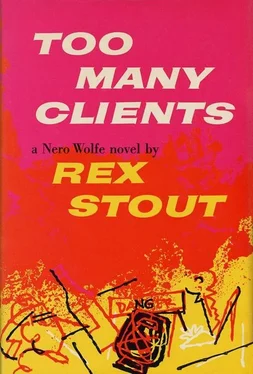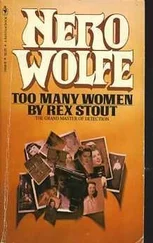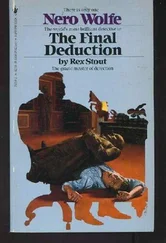“Nothing.” Aiken went back to Wolfe. “So that’s why I am concerned. You won’t deny that it’s a legitimate concern?”
“No indeed. Legitimate and exigent. But also desperate; you can’t possibly hope that Mr. Yeager’s connection with that room will never be divulged.”
“I don’t hope. I act. Will you tell me how you learned about it?”
“No.”
“I’ll pay you for it. I’ll pay well.”
“I don’t sell information, Mr. Aiken, I sell services.”
“I’m buying them. You said you weren’t engaged; you are now. I’m hiring you.”
“To do what?”
“Whatever may be necessary to protect the reputation and interests of my corporation, Continental Plastic Products. I am acting for the corporation.”
Wolfe shook his head. “I doubt if it would work. I couldn’t undertake not to disclose Mr. Yeager’s connection with that room; events might take charge. The alternative would be for me to take charge of events.”
“How?”
“By guiding them. It would be futile for you to pay me not to reveal what I have learned about that room, even if I were ass enough to accept it; sooner or later the police will inevitably discover it, given time. The only feasible way to protect the reputation and interests of your corporation with any hope of success would be to stop the police investigation of the murder by reaching an acceptable solution of it without involving that room.”
Aiken was frowning. “But that may be impossible.”
“Also it may not be. It is highly probable that whoever killed him knew of that room and its character and function; but suppose, for instance, that it was an outraged husband or father or brother or paramour. That might conceivably be established without disclosing some of the particulars, including the place where the misconduct had occurred. It would be difficult, but it might be done. It would be pointless even to conjecture until more is known.”
“And if it proved to be impossible?”
Wolfe’s shoulders went up an eighth of an inch and down. “You will have wasted your money. My self-esteem is not up to tackling the impossible. I remark that you are coerced not by me but by the situation. You are threatened not by me but by my possession of a fact. So you want to hire me, and I am willing to be hired, but I will perform only those services that are proper to my calling and my probity. I can’t exclude any possibility, even that you killed Yeager yourself.”
Aiken smiled, again not with amusement. “I can.”
“Naturally.” Wolfe turned. “Archie, the typewriter. Two carbons.”
I whirled my chair, pulled the machine around, arranged the paper with carbons, and inserted them. “Yes, sir.”
“Single-spaced, wide margins. The date. On behalf of my corporation, Continental Plastic Products, I hereby engage Nero Wolfe to investigate the circumstances of the death of Thomas G. Yeager. It is understood that Wolfe will make every effort to protect the reputation and interests of the corporation, comma, and will disclose no facts or information that will harm the corporation’s repute or prestige, comma, unless he is compelled to do so by his legal obligation as a citizen and a licensed private detective, semicolon; and if he fails to observe this provision he is to receive no pay for his services or reimbursement for his expenses. The purpose of this engagement of Nero Wolfe is to prevent, comma, as far as possible, comma, any damage to the corporation as a result of the special circumstances of Yeager’s death. Below a space for signature put ‘President, Continental Plastic Products.’ ”
I had typed it as he spoke. After taking it out and running over it, I handed the original to Aiken and the carbons to Wolfe. Aiken read it twice and looked up. “Your fee isn’t specified.”
“No, sir. It can’t be. It will depend on what and how much I do.”
“Who decides if you have faithfully observed the provision?”
“Reason and good faith, applied jointly. If that failed, it would be decided by a court, but that contingency is remote.”
Aiken glanced over it again, put it on the stand at his elbow, took a pen from his pocket, and signed it. I took it and gave it to Wolfe and handed one of the carbons to Aiken. He folded it and stuck it in his pocket, and spoke.
“How and when did you learn about that room?”
Wolfe shook his head. “I don’t start a difficult job by babbling, even to you.” He glanced at the wall clock, pushed his chair back, and arose. “It’s past midnight. I’ll report to you, of course, but when and what is solely in my discretion.”
“That’s absurd. You’re working for me.”
“Yes, sir. But the only test of my performance is its result. It may be that the less you know of its particulars the better.” He picked up the signed original. “Do you want this back?”
“No. I want to know how you’re going to proceed.”
“I don’t know myself.”
“You know this. Did one of my directors tell you about that room?”
“No.”
“Did Mrs. Yeager tell you?”
“No.”
“Then who did?”
Wolfe glared at him. “Confound it, sir, shall I drop this thing in the wastebasket? Do you want this job done or not?”
“It’s not what I want, it’s what I’m stuck with. You have the handle.” He got up. “Come, Miss McGee.”
At half past ten Wednesday morning I stood by the big globe in the office, twirling it, trying to find a good spot to spend my vacation in the fall. Having spent a couple of hours trying to decide what I would tell me to do if I were Wolfe, and coming to the conclusion that the most sensible would be to go out and sweep the sidewalk, it had seemed advisable to put my mind on something else for a while. When Wolfe has instructions for me in the morning he sends word by Fritz that I am to come up to his room. That morning there had been no word, and at a quarter to nine I had buzzed him on the house phone. Getting nothing but a prolonged growl, I had started to make a list of the things he might have put on my program for the day and came up with that one item: sweeping the sidewalk.
I had done fine, no question about that. I had set out at nine o’clock Tuesday morning to dig up a client, and by midnight, in only fifteen hours, we had a beaut, not only the president of a big corporation but the corporation itself. To collect a five-figure fee all we had to do was earn it. So first we...
We what? Our big advantage was that we knew Yeager had been killed in that room, and probably no one else knew it but the Perez family and the murderer. We also knew that Yeager had expected female company Sunday evening, since he had ordered caviar and pheasant for midnight delivery. But granting that she had come, it didn’t have to be that she had killed him; she might have found him dead on arrival. Taking it from that angle, the way to start would be to get a complete list of the women who had keys. That might be done in a year or so, and the next step would be to find out which one had — Nuts.
Of the three angles to a murder problem — means, opportunity, and motive — you pick the one that seems most likely to open a crack. I crossed off opportunity. Everyone who had keys had opportunity. Then means — namely, a gun capable of sending a bullet through a skull. It had not been found, so the way to go about it was to get a complete list of the people who had keys and also had access to a gun, and then — I crossed off means. Then motive. Having no personal experience of the methods and procedures in a bower of carnality, I wasn’t qualified as an expert, but surely they might have aroused strong feelings in any or all of Yeager’s guests. Say there had been ten different guests in the last couple of years. Allow them three apiece of husbands, brothers, fathers, and what Wolfe called paramours, and that made forty likely prospects with first-rate motives. I crossed off motive.
Читать дальше












